Top Rankings
Berlin Area School District ranks among the top 20% of public school district in Wisconsin for:
Category
Attribute
Diversity
Most diverse schools (Top 1%)
For the 2025 school year, there are 2 public elementary schools serving 822 students in Berlin Area School District. This district's average elementary testing ranking is 5/10, which is in the bottom 50% of public elementary schools in Wisconsin.
Public Elementary Schools in Berlin Area School District have an average math proficiency score of 41% (versus the Wisconsin public elementary school average of 41%), and reading proficiency score of 38% (versus the 38% statewide average).
Minority enrollment is 28% of the student body (majority Hispanic), which is less than the Wisconsin public elementary school average of 35% (majority Hispanic and Black).
Overview
This School District
This State (WI)
# Schools
3 Schools
1,586 Schools
# Students
1,297 Students
535,621 Students
# Teachers
109 Teachers
40,388 Teachers
Student : Teacher Ratio
12:1
12:1
District Rank
Berlin Area School District, which is ranked within the bottom 50% of all 444 school districts in Wisconsin (based off of combined math and reading proficiency testing data) for the 2021-2022 school year.
The school district's graduation rate of 90-94% has stayed relatively flat over five school years.
Overall District Rank
#229 out of 450 school districts
(Bottom 50%)
(Bottom 50%)
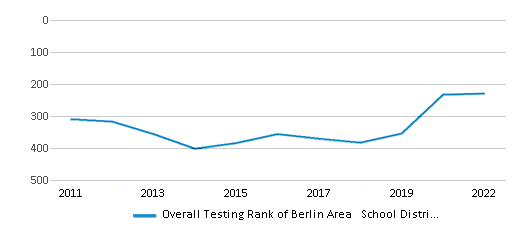
Math Test Scores (% Proficient)
39%
39%
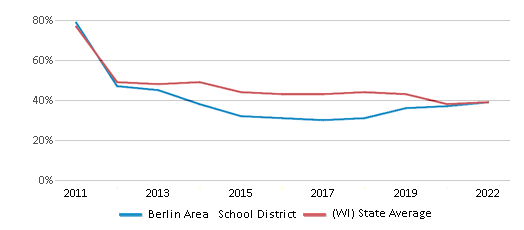
Reading/Language Arts Test Scores (% Proficient)
38%
38%
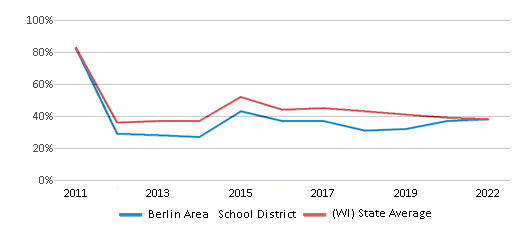
Science Test Scores (% Proficient)
42%
44%
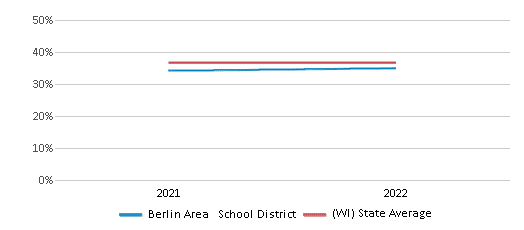
Graduation Rate
90-94%
90%
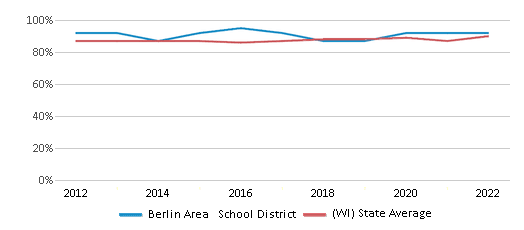
Students by Ethnicity:
Diversity Score
0.43
0.55
# American Indian Students
1 Student
6,515 Students
% American Indian Students
n/a
1%
# Asian Students
15 Students
23,574 Students
% Asian Students
1%
4%
# Hispanic Students
243 Students
75,919 Students
% Hispanic Students
19%
14%
# Black Students
12 Students
50,658 Students
% Black Students
1%
10%
# White Students
949 Students
347,991 Students
% White Students
73%
65%
# Hawaiian Students
5 Students
422 Students
% Hawaiian Students
n/a
n/a
# Two or more races Students
71 Students
30,466 Students
% of Two or more races Students
6%
6%
Students by Grade:
# Students in PK Grade:
59
35,005
# Students in K Grade:
70
50,552
# Students in 1st Grade:
71
53,742
# Students in 2nd Grade:
84
55,228
# Students in 3rd Grade:
82
55,323
# Students in 4th Grade:
76
55,906
# Students in 5th Grade:
95
56,303
# Students in 6th Grade:
91
56,734
# Students in 7th Grade:
100
49,193
# Students in 8th Grade:
94
49,927
# Students in 9th Grade:
120
4,138
# Students in 10th Grade:
111
4,221
# Students in 11th Grade:
112
4,465
# Students in 12th Grade:
132
4,884
# Ungraded Students:
-
-
District Revenue and Spending
The revenue/student of $18,596 is higher than the state median of $17,039. The school district revenue/student has grown by 12% over four school years.
The school district's spending/student of $17,322 is higher than the state median of $17,011. The school district spending/student has grown by 12% over four school years.
Total Revenue
$24 MM
$13,869 MM
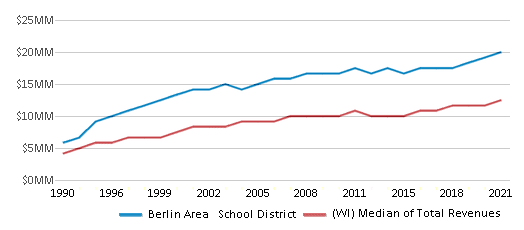
Spending
$23 MM
$13,846 MM
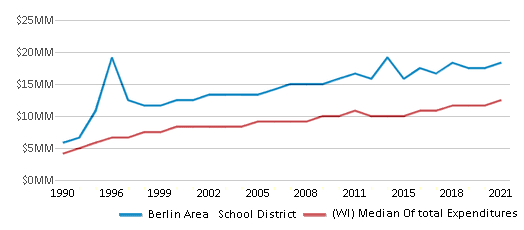
Revenue / Student
$18,596
$17,039
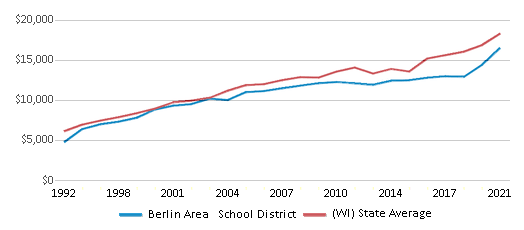
Spending / Student
$17,322
$17,011
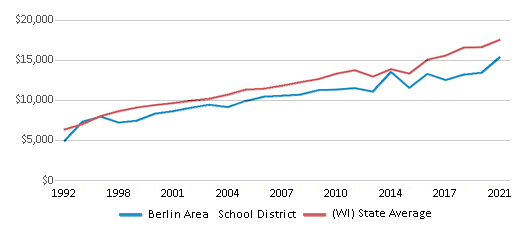
Best Berlin Area School District Public Elementary Schools (2025)
School
(Math and Reading Proficiency)
(Math and Reading Proficiency)
Location
Grades
Students
Rank: #11.
Clay Lamberton Elementary School
(Math: 51% | Reading: 36%)
Rank:
Rank:
6/
Top 50%10
259 E Marquette St
Berlin, WI 54923
(920) 361-2442
Berlin, WI 54923
(920) 361-2442
Grades: PK-5
| 537 students
Rank: #22.
Berlin Middle School
(Math: 32% | Reading: 39%)
Rank:
Rank:
5/
Bottom 50%10
242 Memorial Dr
Berlin, WI 54923
(920) 361-2441
Berlin, WI 54923
(920) 361-2441
Grades: 6-8
| 285 students
Recent Articles

What Is A Charter School?
Explore the world of charter schools in this comprehensive guide. Learn about their history, how they operate, and the pros and cons of this educational innovation. Discover key facts about charter schools, including admission policies, demographics, and funding, as well as what to look for when considering a charter school for your child.

10 Reasons Why High School Sports Benefit Students
Discover the 10 compelling reasons why high school sports are beneficial for students. This comprehensive article explores how athletics enhance academic performance, foster personal growth, and develop crucial life skills. From improved fitness and time management to leadership development and community representation, learn why participating in high school sports can be a game-changer for students' overall success and well-being.

February 05, 2025
Understanding the U.S. Department of Education: Structure, Impact, and EvolutionWe explore how the Department of Education shapes American education, from its cabinet-level leadership to its impact on millions of students, written for general audiences seeking clarity on this vital institution.





